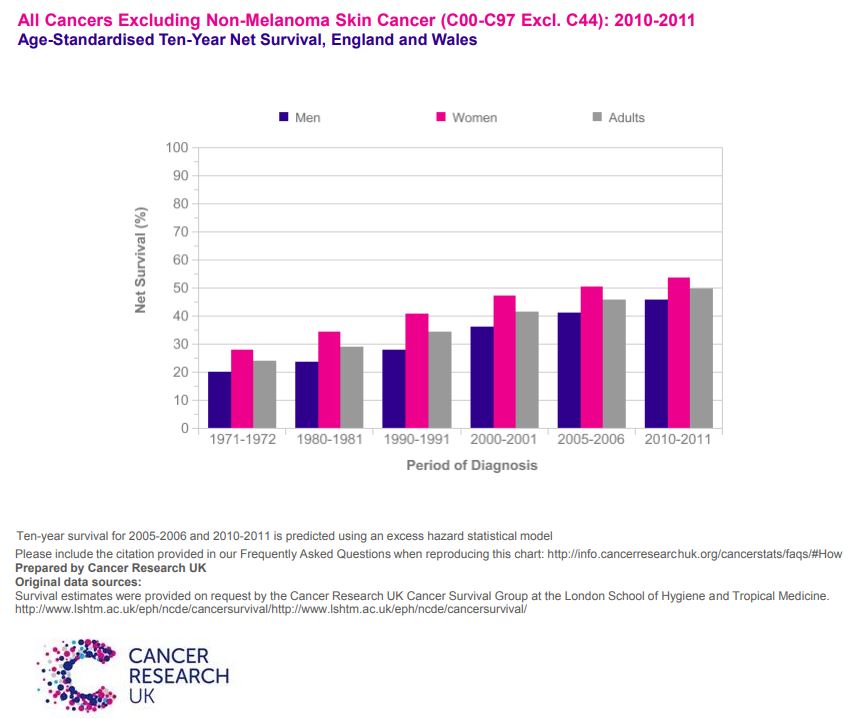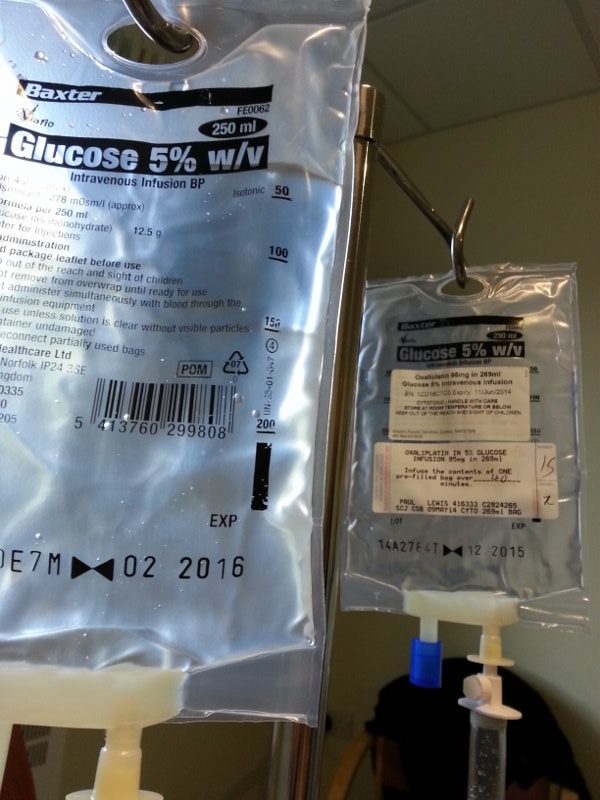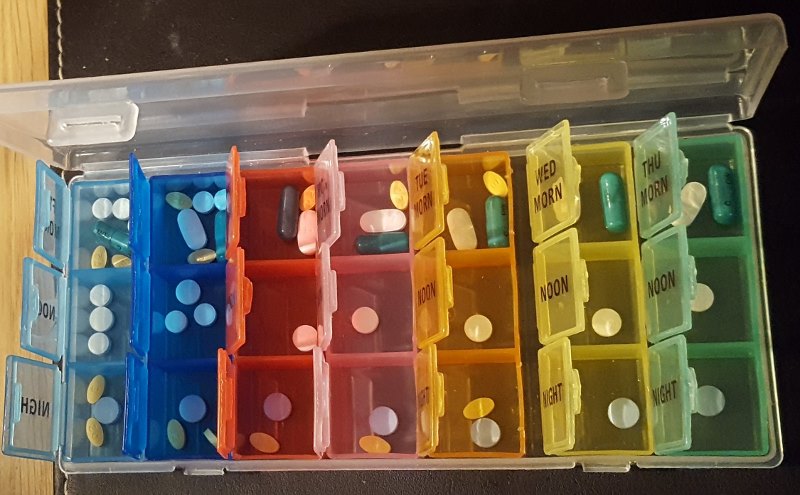Now, I know that, on the face of it, this is a strange question to consider, but it’s a question that a lot of people ask. The argument that chemotherapy can’t cure cancer is the staple of a great many people who argue in favour of alternative treatments. Chemotherapy can’t cure cancer, and it’s poison, the argument goes; you should use [insert name of alternative treatment here] instead.
Outside of other people’s skepticism, there’s the simple fact that I’ve had two different courses of chemotherapy, and I’m not cured. I did six months in 2014 and another six months in 2016, and my most recent recurrence was in 2018. So, in my case, the observable truth is that chemotherapy has not cured my cancer.
Furthermore, both of my parents have had cancer: one more than five years ago; the other nearly 20 years ago. They’re both in remission, which is as close to being called ‘cured’ as you’re likely to get. And neither of them had chemotherapy.
Or to put it another way:
- I’ve had chemotherapy twice and my cancer is not cured
- neither of my parents had chemotherapy and both of their cancers are cured.
Interesting, isn’t it?!
But then my question is, ‘Can Chemotherapy Cure Cancer’, not, ‘Does Chemotherapy Always Cure Cancer’.
Because the answer to the latter question is, ‘Obviously not!’

By Alex E. Proimos – https://www.flickr.com/photos/proimos/4199675334/, CC BY 2.0, https://commons.wikimedia.org/w/index.php?curid=22535544
If Chemotherapy always cured cancer, I wouldn’t be writing this post, because there’d be no cancer to write about. In fact, I wonder what I would be doing now, if the last five years of my life hadn’t been dominated by cancer treatments… Probably baking a cheesecake.
To my mind, I’ve always considered chemotherapy to be a part of a treatment regime that also included surgery, radiotherapy and, increasingly, immunotherapy. Of these, I’ve always thought of surgery as being the most important aspect. Mum and dad, for example, didn’t need anything like chemotherapy because the surgery removed the problem. My first chemotherapy was to debulk the tumours in order to make surgery more effective. Which was pretty ineffective. My second chemotherapy was palliative in nature and just designed to prolong my life. Which it did really rather well, without actually curing me.
So, with all this in mind, there is a legitimacy to the question of whether chemotherapy, on its own, can actually cure cancer.
And, to my surprise, the answer to whether chemotherapy can cure cancer is: it’s complicated!
The Cancer Research UK page on How Chemotherapy Works, offers the following insight:
“The chance of the chemotherapy curing your cancer depends on the type of cancer you have.
- With some types of cancer, most people are cured by chemotherapy
- With other types of cancer, fewer people are completely cured
Examples of cancers where chemotherapy works very well are testicular cancer and Hodgkin lymphoma.”
And that is about as positive a message as I could find about the curative properties of chemotherapy.
The opponents of chemotherapy will refer to a 2004 Australian study entitled, ‘The contribution of cytotoxic chemotherapy to 5-year survival in adult malignancies.‘ This results of this study were:
“The overall contribution of curative and adjuvant cytotoxic chemotherapy to 5-year survival in adults was estimated to be 2.3% in Australia and 2.1% in the USA.”

Photo by Joey Csunyo on Unsplash
This would suggest that chemotherapy cures around 2¼% of cases. And I know that I’m oversimplifying this. I know that people argue that the results only refer to a 5-year survival rate and this is not the same as cured. I know this because I’m living it. I’m just crossing my 5-year survival mark and I’m not cured. The Cancer Research UK site points out, ‘with some types of cancer, most people are cured by chemotherapy.’ The cancers it is referring to are not particularly common, so a 2¼% overall cure rate could be applicable.
To deny, then, that there is ever a time that chemotherapy can cure cancer seems ridiculous. I have no interest in the absolutist stance that chemotherapy cannot cure any cancer. Any more than I am interested in the stance that chemotherapy can cure all cancer. Demonstrably, neither of these positions is true.
However, it could well be the case that chemotherapy will only cure a couple of percent of cancer cases. Which is actually far lower than I thought. Also, a completely different outcome to what I expected to find when I started writing this.
It is, however, important to remember that the 2¼% figure relates to cure from chemotherapy alone.
In most cases, though, chemotherapy is offered as part of a package of treatments. The Cancer Research UK page makes reference to this:
“With some cancers, chemotherapy can’t cure the cancer on its own. But it can help in combination with other types of treatment. For example, many people with breast or bowel cancer have chemotherapy after surgery to help lower the risk of the cancer coming back.”
As we’ve established. this is not always that effective.
Proponents of the Australian study, however, argue that the 2¼% figure includes Chemotherapy in combination with other forms of treatment. Indeed, the conclusion of that report goes on to state:
“As the 5-year relative survival rate for cancer in Australia is now over 60%, it is clear that cytotoxic chemotherapy only makes a minor contribution to cancer survival. To justify the continued funding and availability of drugs used in cytotoxic chemotherapy, a rigorous evaluation of the cost-effectiveness and impact on quality of life is urgently required.”
The argument here is that chemotherapy just doesn’t give sufficient return in investment. Others insist that we’re only still using chemotherapy at all, because we’ve always used chemotherapy…
But this doesn’t really make a lot of sense.
The one, five and ten year survival rates are all on the increase. They’ve actually doubled in my lifetime:

And, frankly, the observable facts of such an impressive growth in survival rates completely trumps the results of one study, which is now well over a decade old. There is no question that chemotherapy has been consistently used since the 1970s. There is also no question that survival rates have doubled. And while this does not prove a causal relationship, I’ll need to see something persuasive to make me dismiss that any form of relationship exists. And one paper from 2004 is not it.
I’ve deliberately chosen to use the data from the 10 year survival rate to remove any ambiguity about the 5-year rate mentioned in the study. It also addresses the implication, from those opposed to chemotherapy, that the 2¼% of people who do struggle past the 5-year mark all, more or less, die within a couple of weeks.
So, in answer to the question, can chemotherapy cure cancer, the answer is yes.
Yes it can.
Although, not as often as I’d previously thought. Certainly when used on its own.
But, when used with a combination of other treatments, like surgery and radiotherapy, chemotherapy has helped double the survival rate in the space of 40 years. Which seems a good return on investment to me.
Besides, there is more to chemotherapy than curing cancer. Because, not all cancer can be cured. The Cancer Research UK site explains:
“With some cancers, if a cure is unlikely, your doctor may still suggest chemotherapy to:
- shrink the cancer
- relieve your symptoms
- give you a longer life by controlling the cancer or putting it into remission”

That last one reason was why I got my second treatment of chemotherapy. My second recurrence showed multiple tumours in my liver and one on my lung. I was given the chemotherapy for six months and then remained cancer free for more than a year. After which, the lung tumour returned and was surgically removed. The tumours in my liver have yet to make a reappearance, although another liver tumour did crop up in a different location. You know, to keep me on my toes. That was removed too.
To my mind, without the palliative chemotherapy treatment that I received in 2016, I’d be dead by now. Certainly I’d be very close to the end, and my quality of life over these last three years would have been considerably lower. Don’t get me wrong, my quality of life for the six months that I was on chemotherapy was pretty damn low. But the other two and a half years have been good. And surely that equates to some return on investment?!
Surely that counts for something?
I know that I appreciate chemotherapy. As does my family. Despite how much it sucked.
That said, I also loath chemotherapy. I hated being on it. I dread the day I have to go back on it. But I’m utterly thankful that it’s there because, without it, I wouldn’t be writing this.

6 thoughts on “Can Chemotherapy Cure Cancer?”
Colon cancer patient had 6 cycles of chemo and pipac once, poised to have another pipac, expect remission
Hi Fakhan,
I hadn’t heard of PIPAC until now. It sounds both impressive and a little scary.
I hope your second PIPAC goes well and look forward to hearing that you’ve made it to remission.
All the best,
Paul
Don’t forget to supplement vitamin k2 along with high dose vitamin d.. Its crucial to avoid arterial calcification and to deposit calcium in the bone matrix and not the joints. No point in adding to your problems huh?
Read your blogs and answers at Quora. There’s always a hope that is coming. Paul
Hi Manny,
I quite agree. The way I see it is, that’s it’s my job to hang on long enough for a cure or treatment to arrive.
I think it’s going pretty well, so far. 🙂
All the best,
Paul
Seems like now your battle is yours. Ados are now on their road. You dis the job.